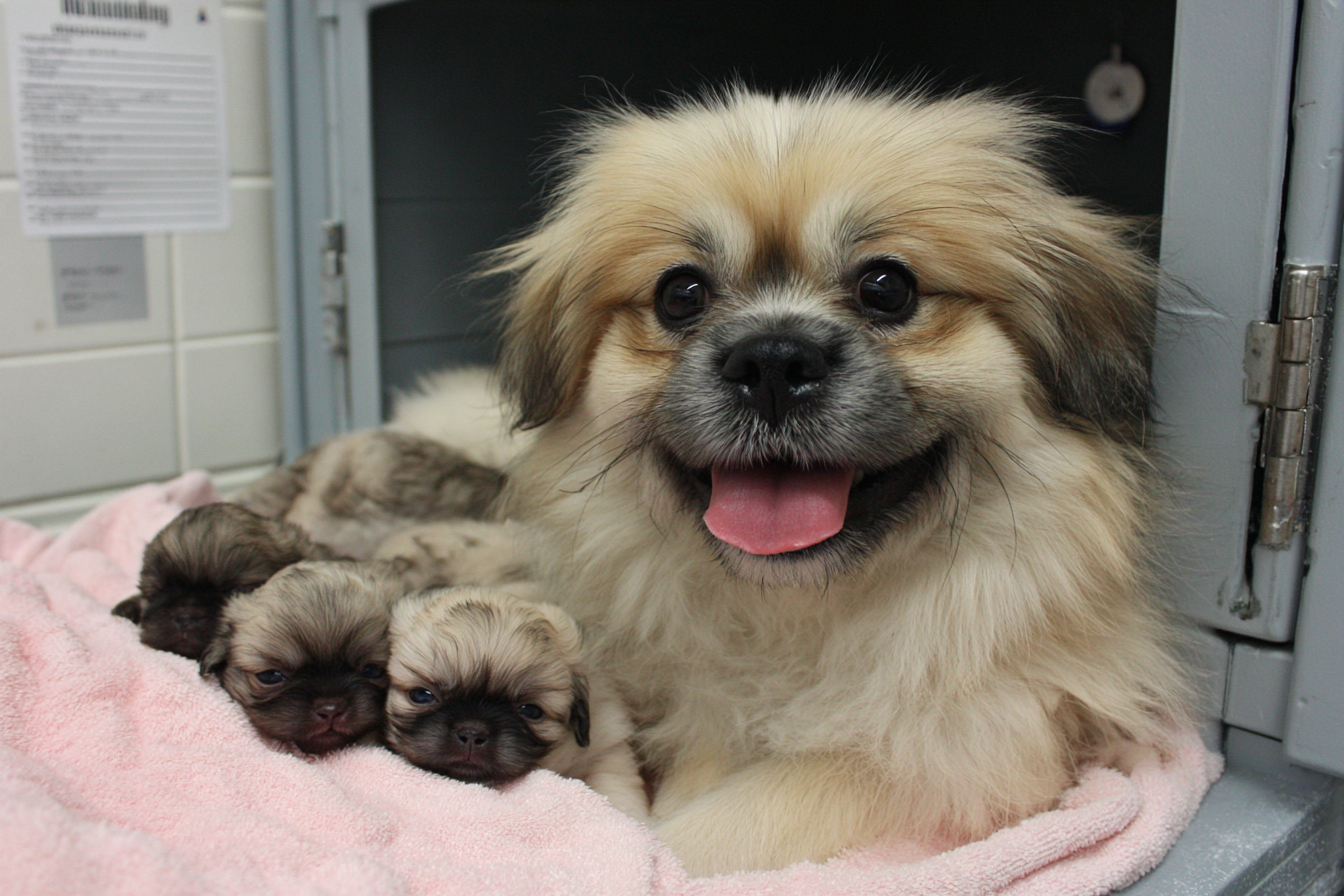Breeding Pekingese dogs is a rewarding but challenging endeavor that demands a deep understanding of the breed’s unique characteristics and specific needs. Responsible breeding goes far beyond simply pairing a male and female dog; it involves thorough health screening, careful planning, and ongoing care for both the mother and her puppies. If you’re interested in breeding Pekingese, it’s essential to learn all the important facts to ensure the health, happiness, and well-being of the dogs involved. This guide will walk you through everything you should know about breeding Pekingese dogs responsibly.
Overview of Pekingese Reproduction
The Pekingese breed, recognized for its compact size, luxurious coat, and distinctive pushed-in face, has some specific reproductive traits that breeders should be aware of. Female Pekingese typically come into heat twice a year, although this can sometimes vary between individuals. The heat cycle lasts around 21 days, with the most fertile period occurring approximately between days 9 and 14.
Because of their brachycephalic (“flat-faced”) structure, Pekingese can be prone to complications during mating and birthing. Artificial insemination is sometimes considered by breeders to reduce the risk during mating, especially if natural breeding proves difficult. Understanding the estrous cycle, signs of fertility, and scheduling the optimal breeding time are important first steps in planning a responsible breeding.
Health Screening for Breeding Dogs
One of the most important factors in responsible Pekingese breeding is ensuring that both the sire and dam are in excellent health and free of hereditary diseases. Comprehensive health screening helps to minimize the risk of passing on genetic disorders to puppies, which can significantly impact their quality of life.
Common health issues in Pekingese include:
- Brachycephalic airway syndrome (due to their flat faces)
- Intervertebral disc disease (spinal problems)
- Eye problems such as progressive retinal atrophy and cataracts
- Patellar luxation (knee instability)
- Heart conditions
Prospective breeding dogs should undergo:
- Thorough veterinary exams
- Eye clearances by a veterinary ophthalmologist
- Cardiac evaluations
- Genetic testing for known hereditary diseases
Beyond physical health, temperament assessment is vital to ensure that puppies will inherit friendly, sociable traits and stable personalities. Breeders dedicated to maintaining breed quality will only select dogs with good temperaments and no behavioral issues for stud or breeding bitches.
Pregnancy and Whelping Basics
Once a Pekingese female is bred successfully, monitoring her health and comfort throughout pregnancy is critical. Pekingese pregnancies last about 63 days, though this may vary by a few days. During pregnancy, you should provide the mother with high-quality nutrition tailored for expectant dogs, including increased protein and calorie content.
It is essential to schedule regular veterinary check-ups to track the progress of the pregnancy and detect any potential issues early. Ultrasounds or X-rays can help determine the number of puppies and ensure their development is progressing normally.
When it’s time for whelping (giving birth), Pekingese owners should prepare a quiet, warm, and clean whelping area. Because of their small size and occasional birthing difficulties due to their head shape, some Pekingese require veterinary assistance or even a cesarean section. Having a trusted veterinarian on call is a smart precaution.
Caring for Newborn Puppies
After birth, immediate attention to the puppies’ health is vital. Newborn Pekingese require a warm environment since they cannot regulate their body temperature well yet. A temperature-controlled whelping box can help keep them at the ideal warmth.
It’s important to monitor the puppies to confirm that they are nursing adequately and gaining weight steadily. The mother generally takes excellent care of her litter, but breeder involvement is crucial to check for any signs of distress or health problems.
Key aspects of puppy care include:
- Keeping the bedding clean and dry
- Weighing puppies daily to monitor growth
- Ensuring the mother is eating well and staying hydrated
- Starting gentle socialization around 3 weeks of age
- Providing necessary vaccinations and deworming under veterinary guidance
Responsible breeders also begin early health and behavior assessments to identify any issues promptly and provide a good foundation for lifelong well-being.
Ethical Considerations and Breed Standards
Breeding Pekingese responsibly demands careful adherence to ethical guidelines and breed standards set forth by major kennel clubs such as the American Kennel Club (AKC). These standards describe the ideal physical and temperamental traits of the breed, including their size, coat, gait, and personality.
Ethical breeders prioritize:
- Health and welfare over profit
- Maintaining breed integrity without encouraging exaggeration of traits that cause suffering (e.g., extreme brachycephalia)
- Avoiding overbreeding or breeding too young or old
- Ensuring puppies go to loving, well-prepared homes
Breeders should also advocate for spaying and neutering pets that are not intended for breeding and educate new puppy owners about proper care. By focusing on producing healthy, well-socialized puppies, breeders contribute positively to the Pekingese community and help preserve the breed’s future.
Finding Reputable Breeders
If you are considering purchasing a Pekingese puppy, selecting a reputable breeder is crucial to getting a healthy and well-adjusted dog. Reliable breeders are transparent about their breeding practices, health testing, and the lineage of their dogs.
When searching for a breeder, look for:
- Clear proof of health screenings and certifications
- Clean and safe breeding facilities
- Opportunities to meet the puppies’ parents in person
- Willingness to answer questions and provide ongoing support
- Membership in recognized canine clubs or breeding organizations
A good breeder will also require prospective buyers to complete an application and interview to ensure the puppy will have an appropriate home. Avoid breeders who always have puppies available or who pressure you into a quick decision. Responsible breeding is never rushed or done casually.
Nurturing a Lifelong Companion
Breeding Pekingese dogs responsibly is a serious commitment that benefits the breed’s health, longevity, and character. Every aspect — from understanding reproductive biology and performing rigorous health testing to caring for puppies and abiding by ethical standards — plays a role in creating wonderful companions who enrich their families’ lives.
Whether you choose to become a breeder or a Pekingese enthusiast looking for a trustworthy source, educating yourself about these key breeding facts helps preserve the distinct charm and vitality of the Pekingese breed for generations to come.







